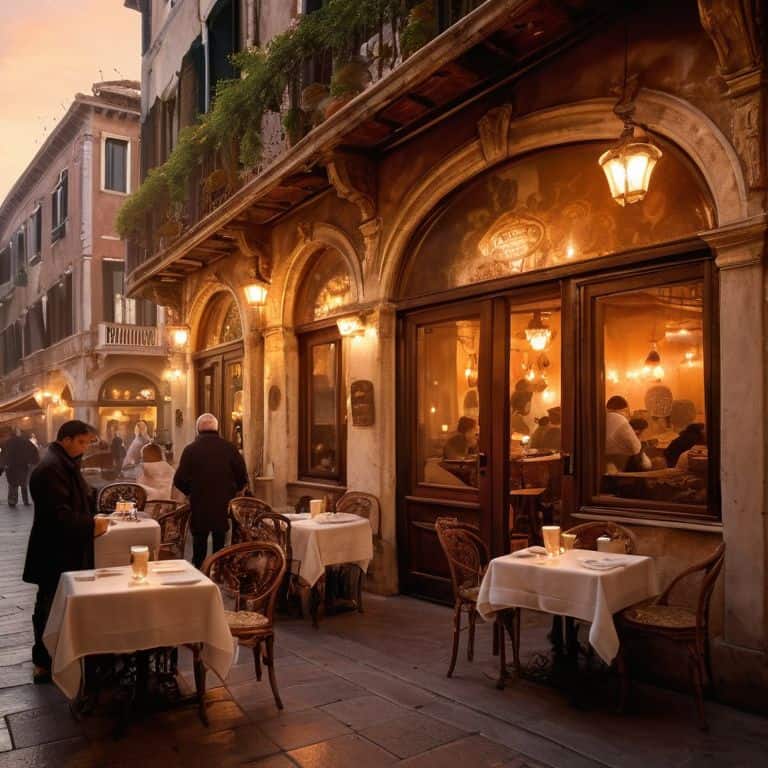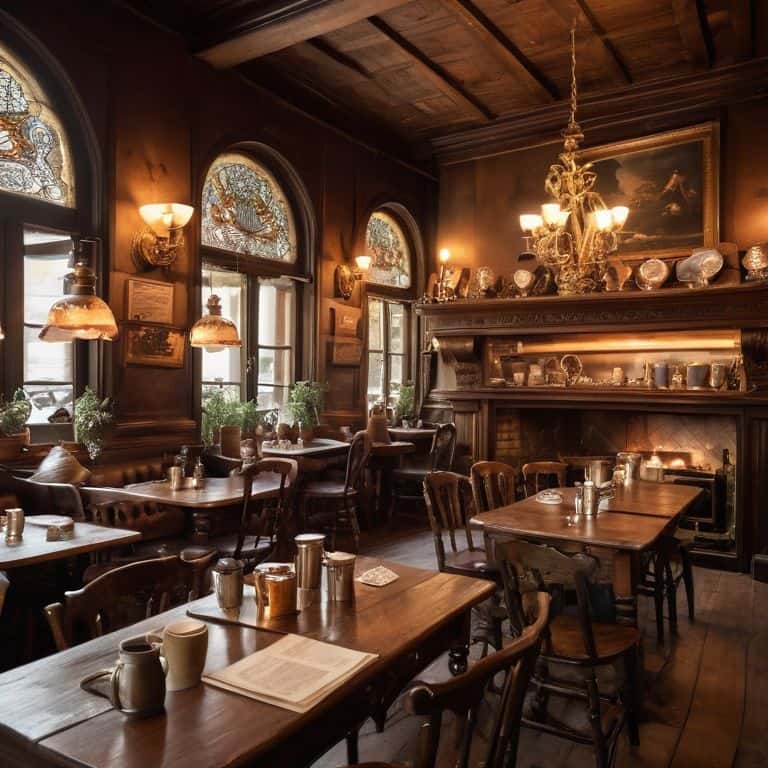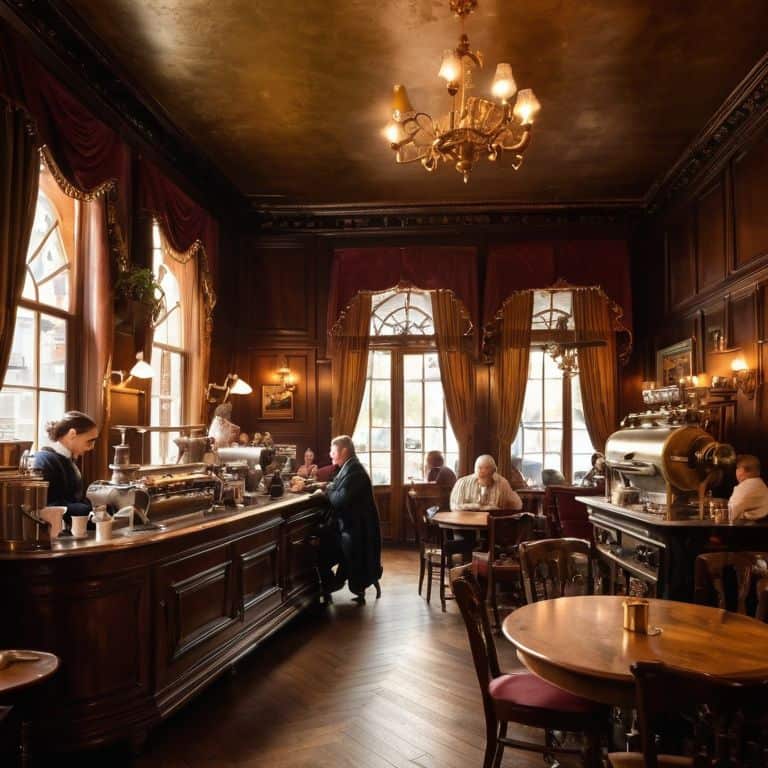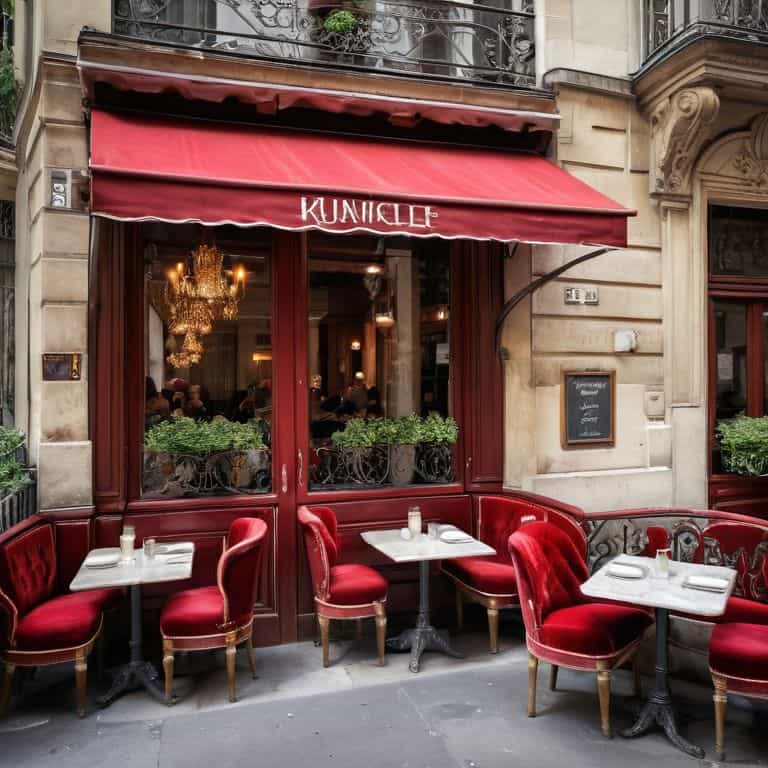As I sit in my favorite old-world café, surrounded by the whispers of centuries past, I am reminded of the rich tapestry that is the history of coffee in Europe. It’s a story that has been woven from threads of revolution, art, and conversation, with coffee as the catalyst that brings people together. I’ve spent years researching and writing about the social role of coffee in different cultures, and I’m often struck by the way that the history of coffee in Europe is reduced to a series of dry, dusty dates and events. But the truth is, the story of coffee in Europe is so much more than that – it’s a story of passion, of creativity, and of community.
In the following pages, I promise to take you on a journey through the hidden corners of Europe’s oldest coffeehouses, where you’ll discover the fascinating stories and characters that have shaped the history of coffee in Europe. I’ll share with you my own experiences, from sipping coffee in a quaint Vienna café to uncovering the secrets of Italy’s oldest coffee roasters. My goal is to provide you with a deeply personal and honest account of the history of coffee in Europe, one that will make you feel like you’re sitting across from me in a cozy café, sipping a cup of coffee and swapping stories. So, let’s embark on this journey together, and uncover the timeless magic that has made coffee an integral part of European culture for centuries.
Table of Contents
Brewing Revolutions

As I delve into the rich tapestry of Europe’s coffee culture, I find myself in the midst of brewing revolutions. The air is alive with the whispers of intellectuals, artists, and politicians who gathered in coffeehouses to shape the course of history. In Renaissance Italy, coffee culture was not only a staple of daily life but also a catalyst for innovation and creativity. The likes of Galileo and Voltaire would often meet in these esteemed establishments to discuss the latest scientific discoveries and philosophical ideas.
In London, the evolution of coffee houses was a gradual one, with the first establishment emerging in the 17th century. These coffee houses became hubs for European Enlightenment thinkers, who would engage in lively debates and discussions over cups of coffee. The atmosphere was electric, with ideas flowing as freely as the coffee. As I sit in a quaint Parisian café, I am reminded of the Parisian cafe society, where artists and writers like Hemingway and Simone de Beauvoir would gather to share their work and inspire one another.
The European coffee trade history is a complex and fascinating one, with Venetian coffee merchants playing a significant role in shaping the industry. As I sip my coffee, I am transported to the bustling ports of Venice, where merchants would trade exotic spices and coffee beans. The smell of freshly brewed coffee wafts through the air, and I am reminded of the coffee and European Enlightenment era, where the beverage played a pivotal role in fostering a culture of intellectual curiosity and creativity.
Coffee Culture in Renaissance Italy
As I wander through the charming streets of Florence, I find myself enchanted by the rich aroma of freshly brewed coffee that wafts from the historic cafes. It’s here, in Renaissance Italy, that coffee culture began to flourish, with the first coffeehouses emerging in the 17th century.
In these intimate settings, intellectual gatherings became the norm, where artists, writers, and philosophers would converge to discuss the latest ideas and innovations, all fueled by the stimulating effects of coffee.
European Coffee Trade History Unveiled
As I delve into the fascinating world of European coffee trade, I am reminded of the intricate networks that once connected the continent. From the port cities of Italy to the bustling markets of Amsterdam, coffee was a highly prized commodity that fueled the growth of international trade.
The coffee merchant played a crucial role in shaping the European coffee landscape, navigating complex webs of supply and demand to bring this coveted beverage to the masses.
The History of Coffee in Europe

As I delve into the rich tapestry of coffee culture in Renaissance Italy, I am reminded of the significant role it played in shaping the region’s intellectual and artistic landscape. The european coffee trade history is a fascinating narrative that weaves together stories of merchants, traders, and travelers who brought this exotic beverage to the continent. In the charming cafes of Venice, I’ve often found myself lost in the aroma of freshly brewed coffee, imagining the venetian coffee merchants who first introduced this drink to the city’s bustling ports.
The evolution of coffeehouses in London is another captivating chapter in the story of coffee in Europe. From humble beginnings to becoming hubs of intellectual and cultural activity, these establishments played a vital role in fostering london coffee house evolution. It was within these walls that some of the most influential minds of the time gathered to discuss politics, literature, and philosophy. As I sit in one of these historic cafes, surrounded by the whispers of the past, I am struck by the profound impact that coffee has had on shaping the course of European history.
In the City of Light, the parisian cafe society was renowned for its elegance and sophistication. Here, coffee was not just a drink, but an experience that brought people together in a shared celebration of art, literature, and music. As I ponder the coffee and european enlightenment, I am reminded of the countless salons and gatherings that took place in these iconic cafes, where the likes of Voltaire and Diderot would engage in lively debates and discussions that would shape the course of modern thought.
London Coffee House Evolution Matters
As I wander through the streets of London, I find myself drawn to the city’s historic coffee houses, where the aroma of freshly brewed coffee still wafts through the air. These establishments have played a significant role in shaping the city’s cultural and intellectual landscape. From the 17th century onwards, London’s coffee houses have been hubs for lively debates, artistic gatherings, and revolutionary ideas.
The evolution of coffee culture in London is a fascinating tale, with coffee houses like Lloyd’s and Garraway’s becoming iconic institutions. As a food historian, I am intrigued by the way these establishments have adapted to changing times, while still maintaining their unique character and charm.
Parisian Cafe Society and Enlightenment
As I sit in a charming Parisian café, I am reminded of the city’s rich history, where coffee and conversation fueled the minds of Enlightenment thinkers. The likes of Voltaire and Rousseau would gather in these very establishments, debating the issues of their time. It was here that the seeds of revolution were sown, and the course of history was altered.
In these historic cafes, intellectual freedom reigned, and the exchange of ideas was unrestricted. The atmosphere was electric, with patrons from all walks of life engaging in lively discussions, from politics to philosophy. As I sip my coffee, I can almost hear the echoes of their debates, and feel the weight of history that permeates these storied walls.
Steeping in History: 5 Essential Tips for Exploring the History of Coffee in Europe
- Immerse yourself in the rich coffee culture of Vienna, where historic cafes like Café Central and Café Sperl have been brewing coffee since the 19th century
- Delve into the fascinating world of 17th-century London coffeehouses, where politicians, writers, and intellectuals gathered to discuss the issues of the day
- Discover the significant role coffee played in the Enlightenment, particularly in Parisian cafes like Café Procope, where thinkers like Voltaire and Diderot would meet to debate and discuss their ideas
- Explore the medieval trade routes that brought coffee from the Middle East to Europe, and how this luxury item became a staple of urban life in cities like Venice and Amsterdam
- Visit the oldest coffee shops in Europe, like Caffè Greco in Rome or Café Florian in Venice, and soak up the atmosphere, imagining the countless conversations, deals, and artistic collaborations that have taken place over cups of coffee throughout the centuries
Unveiling the Essence of Europe's Coffee Heritage
As I delve into the rich history of European coffee, I’ve come to realize that the oldest coffee shops hold the secrets of the city’s soul, where conversations, revolutions, and art have been fueled by the brew
From the Renaissance-era coffeehouses of Italy to the elegant cafes of Paris, each city’s unique coffee culture has played a significant role in shaping its intellectual and artistic landscape, leaving an indelible mark on the continent’s heritage
Through my research and travels, I’ve discovered that the true essence of European coffee lies not just in its flavor, but in the stories of the people who have gathered around the cup for centuries, exchanging ideas, inspiring movements, and crafting the very fabric of our modern society
Echoes of the Past
As I delve into the rich tapestry of Europe’s coffee history, I am reminded that every cup holds a whisper of the past, a story of revolution, art, and love that has been brewed to perfection over centuries.
Isabella Marino
A Legacy in Every Cup

As I reflect on the rich history of coffee in Europe, I am reminded of the vibrant tapestry that has been woven over centuries. From the coffee culture in Renaissance Italy to the London coffee house evolution, and from the Parisian cafe society to the humble beginnings of coffee trade, each thread tells a story of community, innovation, and intellectual curiosity. The history of coffee in Europe is not just about the beverage itself, but about the brewing revolutions it has sparked, the conversations it has ignited, and the art it has inspired.
And so, as we sip our coffee today, let us not forget the soul of the city that can be found in its oldest coffee shop. Let us cherish the tradition of gathering around the cup, of sharing stories, and of forging connections. For in the end, it is not just about the coffee, but about the human experience it represents – a experience that transcends time, borders, and cultures, reminding us that, no matter where we come from, we are all connected through our love of coffee and our desire for community.
Frequently Asked Questions
How did coffee become a staple in European culture, and what role did trade routes play in its dissemination?
As I sip my coffee in a quaint Italian café, I reflect on how trade routes wove a rich tapestry of coffee culture across Europe. Merchants and travelers along the Silk Road and Mediterranean trade routes introduced coffee to the continent, sparking a phenomenon that would become an integral part of European identity.
What were some of the key social and intellectual movements that emerged from the coffeehouses of 17th and 18th century Europe?
In 17th and 18th century Europe, coffeehouses fostered vibrant social and intellectual movements, including the Enlightenment, where thinkers like Voltaire and Diderot debated in Parisian cafes, and the Scientific Revolution, where minds like Isaac Newton and Edmond Halley converged in London’s coffeehouses to discuss groundbreaking ideas.
In what ways did the tradition of coffee consumption vary across different European countries, such as England, France, and Austria?
As I’ve traveled through Europe, I’ve noticed that each country has its own unique coffee culture. In England, coffee was a hub for intellectual debates, while in France, it was a catalyst for artistic and philosophical movements. Austria, with its grand coffeehouses, embodied a luxurious and refined atmosphere, where coffee was a sensory experience.



